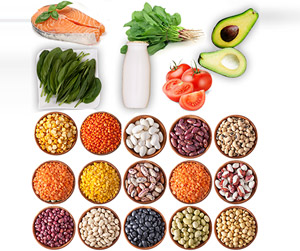 Potassium is a nutrient that is plentiful in many foods, yet most Americans do not get enough of it. It is one of the most abundant minerals in the body and is largely found inside your muscle cells, but also in your bones, liver, and blood.
Potassium is a nutrient that is plentiful in many foods, yet most Americans do not get enough of it. It is one of the most abundant minerals in the body and is largely found inside your muscle cells, but also in your bones, liver, and blood.
It is highly reactive in water and becomes positively charged, acting as an electrolyte in the body. It has many functions in the body, but it’s main functions are to regulate fluid balance, activate nerve impulses, and regulate muscle contractions.
For people who are consuming smaller quantities of food (like gastric sleeve, gastric bypass, and lap band patients), getting enough potassium is important. Taking your vitamins as prescribed by Dr. Shillingford (or your bariatric surgeon) and consuming your protein supplement drinks are important ways to ensure that you are getting the nutrients you need. In addition, consuming stage-appropriate nutrient-rich foods can help you get the nutrition you need after weight loss surgery.
There are many foods that are rich sources of potassium, however, not all sources may be suitable for gastric sleeve, gastric bypass, and lap band patients. Foods like dried fruits and fruit juices can be rich in potassium but have significant amounts of sugar that should not be added to a bariatric diet. There are many lower carbohydrate sources of potassium that are much better suited for a high protein, lower carbohydrate diet as followed by weight loss surgery patients. These include:
- Green vegetables (spinach, kale, beet greens, swiss chard)
- Beans (pinto beans, cannellini, black, refried, lima, navy)
- Lentils
- Avocado
- Tomatoes
- Salmon, trout, mackerel, halibut, snapper
- Portobello mushrooms
- Milk products (milk, yogurt, and many milk-based protein supplements)
Adding potassium-rich foods into your post-op bariatric diet should only be done according to the foods allowed at each stage of your bariatric diet. Adding foods too early, no matter how nutrient-rich they are, can lead to complications. Many gastric sleeve, gastric bypass, and lap band patients find that attending Dr. Shillingford’s monthly Nutrition Support Meetings , which are hosted by a bariatric dietitian, are a great way to ask questions and find suggestions for foods to incorporate into each stage of your post-op bariatric diet, as well as foods that might cause intolerance.
For more information on Dr. Shillingford’s monthly Nutrition Support meetings, or about gastric sleeve, gastric bypass, or lap band surgery, call Dr. Shillingford’s office today at (561) 483-8840. His office staff can also help you schedule your free informational session to find out if gastric sleeve, gastric bypass, or lap band surgery is right for you.

 Am I A Candidate
Am I A Candidate  BMI Calculator
BMI Calculator  Why Choose Us
Why Choose Us